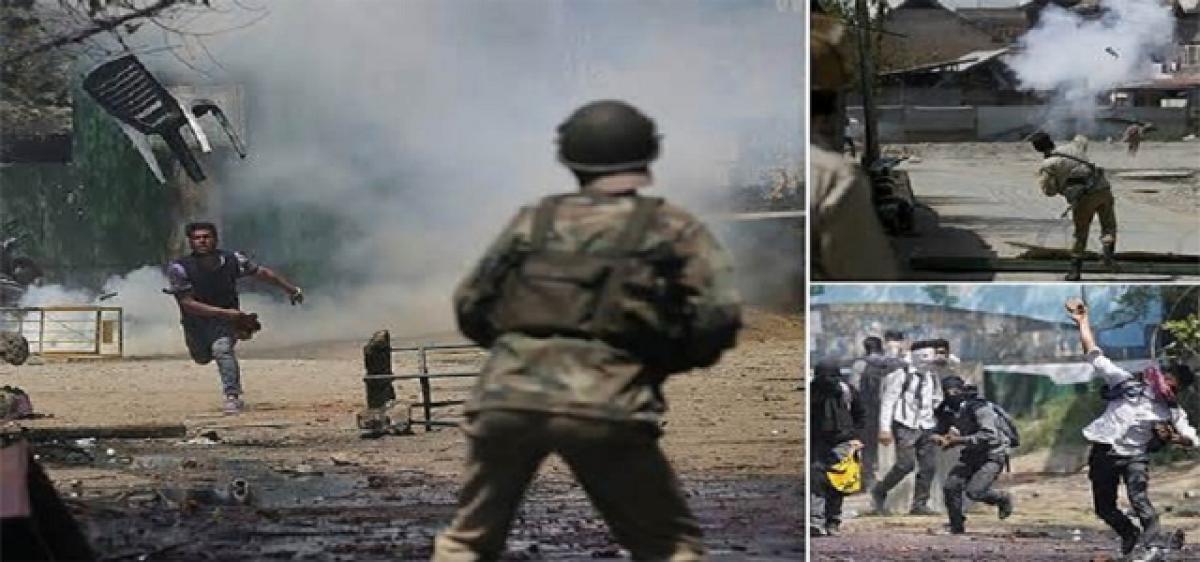Live
- Fire breaks out at an apartment in Manikonda, no casualties
- Govt successfully implementing Deepam-II: Manohar
- Preliminary probe suggests deliberate arson to erase evidence
- Hyderabad: Police bust burglar gang, arrest four
- Spiritual fervour marks Karthika Pournami
- Give big nudge to solar power production thru SHGs: Bhatti
- VIT-AP celebrates National Library Week
- Experts flag concern over faulty upkeep of tracks, chinks in infra
- Render services for people’s upliftment
- Safe Stay Audit programme for IT and ITES sector launched
Just In

Unlikely, given past experience. And the current political stalemate might unfortunately continue. In its submission before the Supreme Court, the Union government ruled out talks with those who challenge the state\'s accession to India.
Would the central government's assertion that talks to improve the situation in Kashmir can only be held with mainstream political parties and not separatists have a positive impact in the Valley?
Unlikely, given past experience. And the current political stalemate might unfortunately continue. In its submission before the Supreme Court, the Union government ruled out talks with those who challenge the state's accession to India.
The apex court has also disposed off a petition filed by the Kashmir Bar Association that said the Centre was doing little to improve the ground situation in the Valley. The court asked the association to do its bit by coming up with suggestions that would help improve the situation.
The opposition National Conference (NC) has slammed the decision against engaging the separatists in a dialogue. An NC statement said the announcement was the last nail in the agenda of the alliance of the Peoples Democratic Party (PDP) and the Bharatiya Janata Party (BJP), the allies that rule Jammu and Kashmir.
The agenda of alliance, signed by the PDP and the BJP, had stated that talks would be held with every stakeholder in Kashmir to bring permanent peace to the state. Whenever trouble erupts in Kashmir, voices become shriller for dialogue and reconciliation.
During the 2010 unrest, when Omar Abdullah headed the NC-Congress coalition in the state, two Round Table Conferences of all political parties were held at the behest of then Prime Minister Manmohan Singh. Some 120 civilian protesters died in that unrest.
Trouble again erupted last July following the killing of Hizbul commander Burhan Wani in a gunfight with the security forces. It was only the setting in of winter that finally broke the bloody cycle of violence in which 94 civilian protesters lost their lives in clashes with the security forces. That bout of violence also brought senior leaders of all national political parties to the Valley to help find ways to end the face-off.
The moot point is that talks with those accepting the state's accession with India are always welcome, but these have not been beneficial beyond a point so far. The trouble lies on the other side of the political spectrum in Kashmir.
The separatists have claimed a huge victory because of the extremely low voter turnout during the (recently-held) parliamentary by-election in Srinagar. PDP insiders argue that an outright rejection of talks with all stakeholders, including the separatists, would further shrink the mainstream political space.
Chief Minister Mehbooba Mufti, who met the Prime Minister in Delhi earlier this week, told reporters immediately after that unless talks are also held with the separatists, the situation might never improve in Kashmir. She even invoked Atal Bihari Vajpayee's doctrine of dialogue within the ambit of "Insaniyat, Jamhooriyat and Kashmiriyat" (Humanity, Democracy, Kashmiri ethos).
Whither is Kashmir headed today?
Well, the murder of Pulwama PDP district president Abdul Gani Dar by militants, was condoled by the party in the winter capital Jammu and not in the slain leader's village in Pulwama.
Isn't that ominous?
By Sheikh Qayoom

© 2024 Hyderabad Media House Limited/The Hans India. All rights reserved. Powered by hocalwire.com







